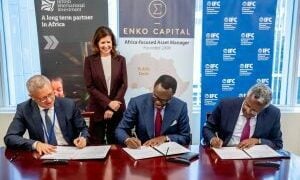In an effort to boost power generation in the country, the federal government has pledged to revive the Rusal Aluminium Smelter Company of Nigeria (ALSCON), Ikot Abasi, Akwa Ibom State, by ensuring its connection to the national grid.
The Minister of Power, Adebayo Adelabu, committed this during a working visit to the company.
The minister, on Tuesday, decried that several years after its establishment, the company had suffered from a lack of alternative electricity supply, which he said had hindered the country from benefiting from the considerable investment.
However, he stated that when revived and fully operational, the plant will add 540 megawatts of electricity to the grid while providing direct and indirect employment opportunities for about 15,000 Nigerian professionals and the teeming youth population.
According to him, the company has an installed capacity of 540 MW, comprising six turbines of 90 MW each. He also reiterated the company’s relevance in supplying raw materials to downstream aluminium companies.
He said, “These huge investments by the country have suffered from lack of power supply in the last 27 years, as they have not been connected to the grid, and we are very much aware of the huge potential of an institution like this in the upstream, midstream and downstream conversion of aluminium, that can create a lot of employment for our teeming youths, that can also serve as a supplier of raw materials to every downstream aluminium company and save us huge foreign exchange for imports of these raw materials.
“We have determined the short-term solution to connect this company to the national grid, and we have also agreed on the medium-term solution. But the most important part of this meeting is that the company can also supply 540 MW of power onto the national grid when fully completed.
“Once all the infrastructures are put in place, the 330/132KV substation, which is being constructed by the Niger Delta Power Holding Company, together with the 330KV DC lines from Ikot-Ekpene to Ikot-Abasi, we will be able to evacuate the entire 540MW to the national grid”, he said.
The minister speaking further, hinted on the possibility of expanding the capacity by about 120 MW. He noted an open circuit line that he can use to make a combined circuit, by which an additional 20 MW per turbine can be added to produce 660 MW of power.
“You can imagine what this will add to the national grid capacity. So I’m happy that I came here today. I’ve listened to the company and all the stakeholders, and we have a solution in sight. All we need to do now is go back and work on all the agreed action lines, which I will supervise.
“And I believe that once, within the next 90 days, we can achieve the short-term solution, the country will feel the impact of this company beginning operations. From the number of employees they will generate for us in the country, they can employ up to 3,000 employees here,” he added.
Speaking on the gas supply challenge affecting power generation in the country, Adelabu said that parties must agree on an appropriate price.
He maintained that if the price is right, the gas company will supply, adding that the gas market is highly competitive and that preference will be given to those who pay higher.
“So we believe they can sit down with the gas companies, agree on a commercially viable price, and ensure that gas is supplied.
“That’s the least of the problems here. I believe this can be resolved with appropriate pricing. The gas pipeline is working very well. There’s a power company here that is getting gas. This is less than 500 meters from here. So the gas pipeline is working well. It’s a matter of agreeing to the correct price, or the right price, with the gas company, and the turbines will be fired immediately”, he said.
Also speaking, Viacheslav Krylov, development advisor, noted the challenges in ALSCON, which had hampered operation since the presidential directives in July 2024 to restart operations in the plant.
He said the plant could not begin operation as there was no alternative source of electricity, adding that the current energy options at the plant were entirely inadequate for restarting it.
Krylov, however, hinted that plans were ongoing to ensure the plant achieves full production capacity of 200,000 MT in the sixth year, with over 15,000 direct and indirect employment for Nigerians.





